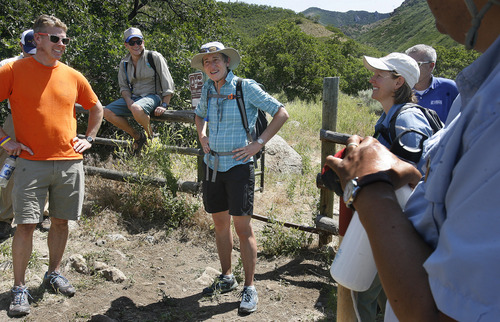This is an archived article that was published on sltrib.com in 2013, and information in the article may be outdated. It is provided only for personal research purposes and may not be reprinted.
Washington • Interior Secretary Sally Jewell on Monday touted the nation's federal lands as an economic engine — one that could start to putter should House Republicans succeed in cutting back on budgets for some key programs.
The Interior Department's activities — from recreation opportunities at national parks to oil and gas drilling to timber harvesting — contributed some $371 billion and 2.3 million jobs to the U.S. Economy last year, the agency said. In Utah alone, the department report suggests Interior's missions boost the economy by $12 billion and 75,000 jobs while bringing 17 million visitors to the state.
"The take-away message from this report, one I hope Congress would take note of, is that the Department of the Interior is an outstanding investment for the American taxpayer," Jewell said in a conference call with reporters.
"When you think about it this way, it's penny-wise and pound-foolish to require budget cuts that force the department to reduce activities that support our nation's economy and create jobs. But that's exactly the situation we're facing today."
A House Appropriations subcommittee has recommended a $10.5 billion budget for Interior, a 12 percent cut from the amount President Barack Obama had asked for in his budget. Jewell said Monday the House plan would cut the department back to a 2002 level, not adjusting for inflation.
The cuts, Jewell said, could slow down permitting for oil and gas drilling, which makes up the largest chunk of revenues for the department, halt valuable and life-saving research and drive down attendance at national parks.
The "reductions are short-sighted and could have immeasurable consequences," Jewell said.
But Rep. Rob Bishop, a Utah Republican and chairman of the House Natural Resources subcommittee over public lands, points out that energy exploration, mining, timber and grazing produce 68 percent of the economic activity that Jewell is citing and 58 percent of the jobs. Only 12 percent of the economic activity is credited to outdoor recreation and 16 percent of the jobs, Bishop notes.
It's not the budget Jewell should be looking at, Bishop says, but the uses of the land.
"Balanced land management can be a major force in generating Western economic activity, job creation, and funding for our schools," Bishop said in a statement. "One-sided policies that seek to lock up federal land are destructive and harmful and I'm hopeful this report will slow down such efforts."
Bishop adds that Interior should focus more on using its budget to manage existing lands and not trying to acquire more, a reference to the agency's efforts through the Land and Water Conservation Fund to buy or preserve more land.



